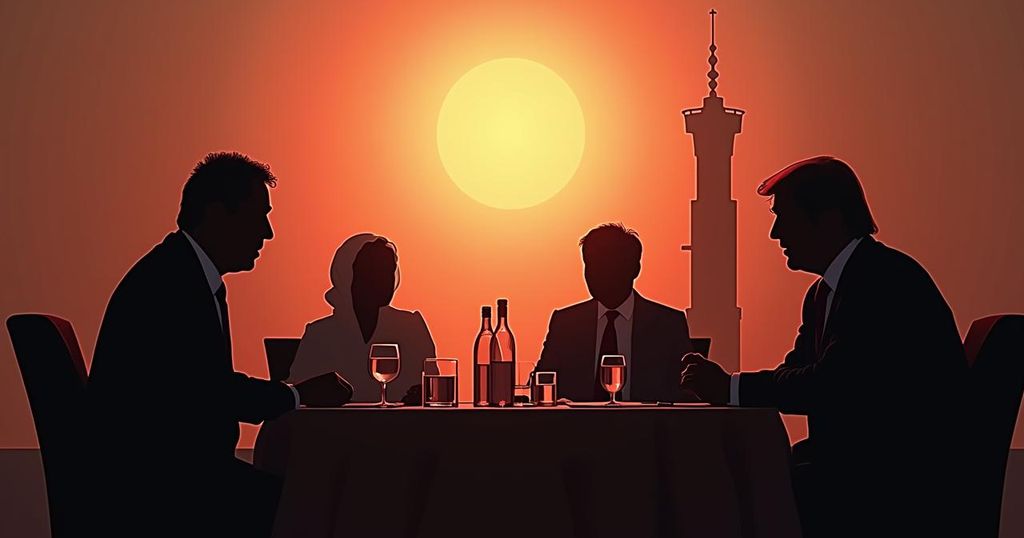Iran Engages with Qatar Amidst Escalating Tensions with Israel
Iranian Foreign Minister Abbas Araghchi met with Qatari Foreign Minister Sheikh Mohammed bin Abdulrahman Al Thani amid rising tensions following Israel’s threats of retaliation for a missile attack attributed to Iran. Discussions focused on the situation in Gaza and Lebanon, with Qatar emphasizing its commitment to regional stability and security. Israel warned of a “deadly, precise and surprising” response, exacerbating fears of a broader conflict in the Middle East.
On Thursday, Iranian Foreign Minister Abbas Araghchi engaged in discussions with his Qatari counterpart, Sheikh Mohammed bin Abdulrahman Al Thani, in Doha. This meeting followed Israel’s recent warning regarding potential retaliatory actions against Iran in response to a missile attack that transpired the previous week. Qatar has emerged as a significant player in diplomatic negotiations concerning a ceasefire in Gaza and has advocated for a truce in Lebanon, particularly amidst Israel’s intensified military operations against the Iran-aligned Hezbollah group. The Iranian Foreign Ministry spokesperson, Esmail Baghaei, indicated that consultations between Araghchi and Sheikh Mohammed addressed these critical conflicts in the region. Baghaei emphasized the urgent need for all nations to bolster their efforts to prevent further escalation in the region, articulating a call to stop the violence in Gaza and the aggressions directed towards Lebanon. The Qatari foreign ministry confirmed that discussions included the ongoing situation in both the Gaza Strip and Lebanon, highlighting Sheikh Mohammed’s commitment to enhancing security and stability on both regional and international fronts. Araghchi’s visit coincided with heightened tensions following Israel’s announcement on Wednesday that it would execute a precise and unexpected response to Iran’s missile barrage, raising concerns over the potential for a broader military conflict in the Middle East. Israeli Defence Minister Yoav Gallant remarked that any action taken against Iran would be “deadly, precise and surprising.” Furthermore, a telephonic dialogue between U.S. President Joe Biden and Israeli Prime Minister Benjamin Netanyahu emphasized the necessity of maintaining close coordination as Israel deliberates its strategies in dealing with Iran. Prior to his meeting in Qatar, Araghchi was in Saudi Arabia to confer with Crown Prince Mohammed bin Salman and Saudi Foreign Minister Prince Faisal bin Farhan, focusing on improving circumstances for Palestinians and Lebanese under Israeli military aggression. Iranian President Masoud Pezeshkian visited Qatar last week, asserting that Tehran is not pursuing a confrontation with Israel but promised a decisive response should Israel retaliate for its recent missile attack. Israel has been engaged in ongoing operations against Hamas in Gaza, following an unprecedented assault by the group on October 7, 2023, which subsequently prompted Hezbollah’s engagement in hostilities against northern Israel. As part of a broader diplomatic strategy, Iran seeks to demonstrate to both the United States and Israel that its efforts to reduce tensions with Gulf States are authentic and yielding results, thereby signaling that escalating hostilities could jeopardize relations with the United Arab Emirates and Bahrain, while rapidly enhancing ties with Saudi Arabia. Negotiations towards formal recognition of Israel by Saudi Arabia have stalled, with officials indicating the necessity of establishing a route toward a Palestinian state as a prerequisite for normalization.
The article addresses the intricate geopolitical landscape in the Middle East, focusing on the escalating tensions between Iran and Israel amidst the backdrop of ongoing conflicts in Gaza and Lebanon. As Israel intensifies its military campaigns against Hamas and Hezbollah, diplomatic efforts led by Qatar and Iran are aimed at negotiating ceasefires and preventing further deterioration of the situation. This interplay of military and diplomatic actions reflects the complex dynamics involving regional powers, including the implications of their relations with the United States and the Gulf States. The recent missile attack attributed to Iran has heightened fears of an expanded conflict, prompting discussions among various state actors regarding security and stability in the region. The shifting alliances and the potential for broader military engagement underscore the delicate balance of power in the Middle East.
In summary, the interactions between Iranian and Qatari officials amid Israel’s threats of retaliation highlight the precarious nature of Middle Eastern diplomacy in the face of escalating military tensions. Qatar’s role as a mediator reflects its commitment to regional stability, while Iran’s strategic outreach aims to emphasize its opposition to Israeli actions and its support for Palestinian and Lebanese interests. As concerns grow over a possible wider war, the need for dialogue and ceasefire negotiations remains critical to alleviating the humanitarian crises in Gaza and Lebanon.
Original Source: www.france24.com




Post Comment